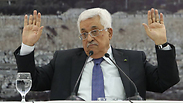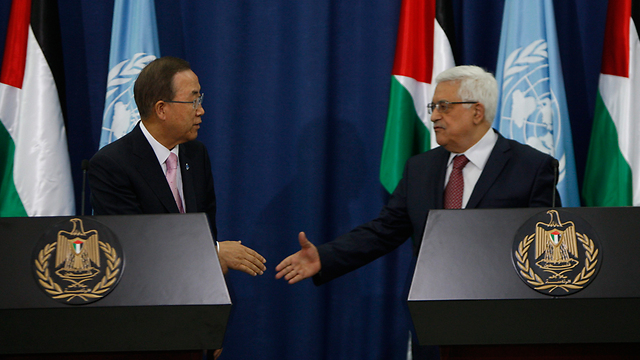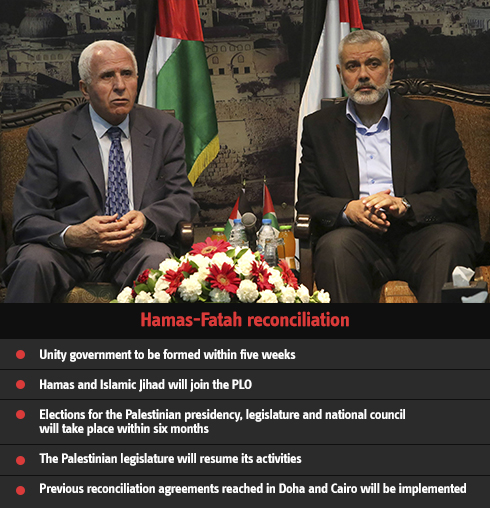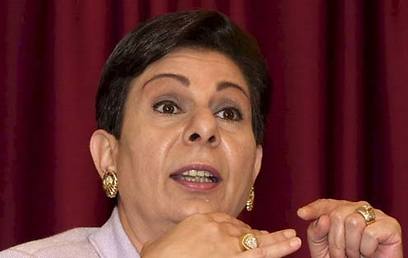
Abbas reportedly assures UN that Hamas will recognize Israel
Netanyahu refuses to talk with Palestinian government 'backed by terrorists' despite Abbas' claims; PLO in response: We don't like talking with Bennett.
Palestinian President Mahmoud Abbas has reportedly assured UN representatives on Thursday that the unity government with Hamas will adhere to the principles of non-violence and recognition of the State of Israel as agreed upon between Israel and the Palestinian Liberation Organization (PLO) in the Oslo Accords, a UN press release claimed.
The Palestinians further slammed Israel for its intervention in internal Palestinian politics, drawing a comparison between Hamas and hard-liner rightists in Netanyahu's government.
A reconciliation agreement signed earlier in the week between rival Palestinian factions Fatah and Hamas aimed to form a unity government within a five week time-frame. It was a move unexpected by US and Israeli peace negotiators who both condemned the agreement, as Hamas is considered to be a terrorist organization by both countries.
Abbas reportedly told Robert Serry, the UN Special Coordinator for the Middle East Peace Process, that the new unity government would be committed to peaceful relations with Israel, and thus contradicted the hard-line stance taken by Netanyahu, who rejected the idea of negotiating with a Palestinian government which included Hamas.
After a six-hour-long meeting with his security cabinet on Thursday, Prime Minister Netanyahu announced Israel is suspending the current US-brokered peace talks as well as implementing economic sanctions against the PA in the West Bank, and was followed by an Israeli media campaign headlined by a video of political highlights of Abbas' accused refusals to work toward peace with the Israelis, beginning a tit-for-tat exchange of statements between Israeli and Palestinian officials.
"What has happened is a great reverse for peace," Netanyahu said in an MSNBC interview. "As long as I'm Prime Minister of Israel, I will never negotiate with a Palestinian government backed by terrorist organizations committed to our destruction."
Related stories:
- Haniyeh: Palestinian unity government within five weeks
- US: 'Disappointed' by Palestinian unity deal
- Israeli source says Palestinian unity agreement 'may be a charade'
When asked what Hamas could do to change his position, Netanyahu told MSNBC that "Hamas could stop being Hamas... Hamas could stop attacking Israel's cities; they've fired over 10,000 rockets at our cities." Netanyahu said that such a change would be "good" but didn't say whether or not he would agree to negotiate if Hamas were to renounce violence.
Hanan Ashrawi, a member of the PLO's Executive Committee, shot back in an interview with the BBC, saying, "I don't see why it is any of Netanyahu's or even America's business to tell us who's acceptable and who's not in a pluralistic political system."
"I can tell you I don't want to talk to Lieberman or we don't want to talk to Naftali Bennett; these are people who are either racist or settlers or who deny Palestinian rights or who treat us as a sub-human species or who want to take all of historical Palestine for greater Israel. These are people who are in the Israeli government coalition," said Ashrawi.
According to Ma'an News Agency Ashrawi furthre said that the "national reconciliation and negotiations are not mutually exclusive, but are rather mandatory steps in order to achieve a just and lasting peace based on international law."
She also said that, "terms of the national reconciliation agreement are clear: Palestine honors its commitments, respects international law and continues its popular nonviolent resistance against the Israeli occupation."
If successfully implemented, the reconciliation would end seven years of severe division between Palestinians. Many believe that the move could strengthen the possibility for peace as any future negotiations would include a united Palestinian Authority.
"We've been striving for national unity because it is the responsibility of any leadership to repair this lethal rift that has weakened the Palestinians," Ashrawi told the BBC.

Meanwhile US officials said on Thursday that they aren't yet willing to give up on current peace talks which due to end on April 29.
"There is always a possibility to advance, but leaders need to make compromises," said US Secretary of State John Kerry. "If they do not wish to make the necessary compromises, it will become very difficult."
Kerry and other US negotiators have been battling to extend the April 29 deadline so that at the very least, talks could continue.
"We will never give up our hope or out commitment for the possibilities for peace," said Kerry. "We believe it is the only way to go."
UN Secretary General Ban Ki-moon published a press release also on Thursday, in which he expressed concern for Palestinian living conditions in Gaza and the illegality of settlements in the West Bank, but also noted the importance of Israel's security.
More importantly, the Secretary General urged a continuation of peace talks past the current deadline saying, "The costs of walking away from the negotiating table would be exponentially higher than the pain of the compromises required to resolve the conflict."
"No lasting peace can be achieved away from the negotiating table, and the current situation is not sustainable for both parties, the region and the international community," he said.












